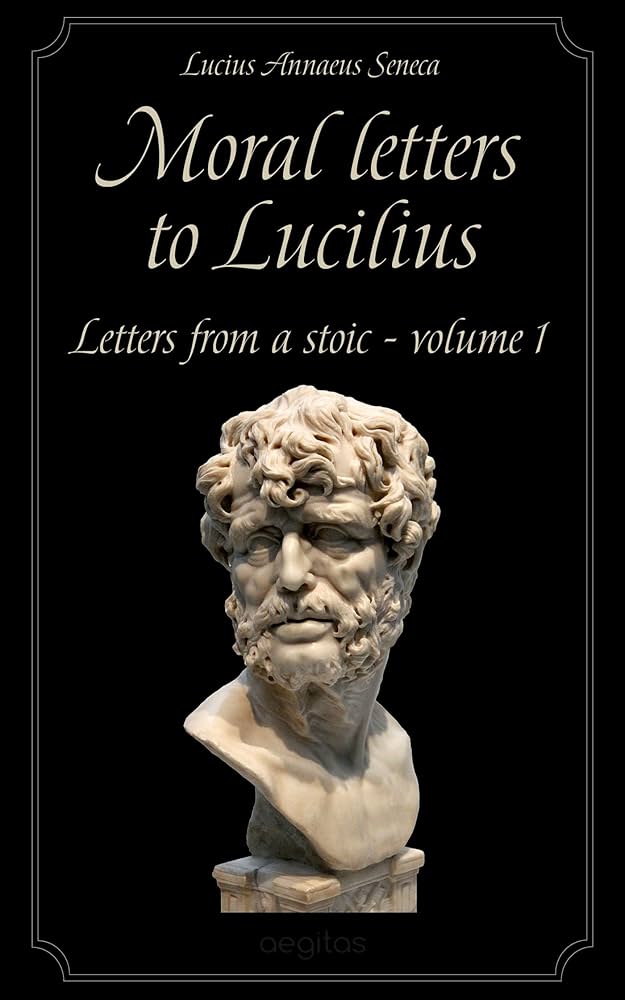Stoicism with a Human Voice: The Elegant Fire of Moral Instruction
Table of Contents
A Philosopher in Correspondence
Lucius Annaeus Seneca, writing during the reign of Nero, was a Roman philosopher, statesman, and dramatist. In his final years, having withdrawn from political life, he composed a series of 124 letters to his friend Lucilius Junior — a procurator in Sicily — offering him not casual updates, but a profound and progressive curriculum of Stoic thought.
Unlike Marcus Aurelius’ private introspection in Meditations, these letters are crafted for an audience — ostensibly for Lucilius, but implicitly for posterity. They represent the culmination of a life lived in tension: between power and virtue, wealth and simplicity, action and reflection.
Content and Style: Philosophy as Life Instruction
Seneca’s letters cover a wide array of topics — from the ethics of wealth, death, anger, time management, and illness, to logic, physics, and the soul. Yet no matter the topic, his tone is always rooted in the practical, the applicable, and the urgent.
“We are always complaining that our days are few, and acting as though there would be no end of them.”
Each letter opens with a casual remark, a moment of personal or social observation. But this quickly transitions into an essay-like meditation on a core philosophical point. This structure makes the letters readable in isolation or as a developing series. The moral arguments grow in complexity across the corpus, offering increasingly subtle guidance on how to live not only wisely, but well.
Seneca’s Latin is elegant and pointed — refined rhetoric meeting unflinching ethical clarity. He excels at metaphor and compresses vast thought into single, luminous lines:
“He who suffers before it is necessary, suffers more than is necessary.”
Core Themes
- The Value of Time: Time, not money or goods, is the one true possession, and must be protected with utmost seriousness.
- Inner Freedom: The Stoic is free even in chains, while the indulgent man is enslaved by his own desires.
- Death and Acceptance: Death is neither good nor bad — merely natural — and fearing it is irrational.
- Wealth and Simplicity: Possessions are not evil, but the love of possessions is spiritually corrosive.
- Friendship and Society: True friendship is rare and requires moral equality; yet the wise man must still serve the common good.
What Makes It Special
Where many philosophical works of the time adopt a detached tone, Seneca speaks with warmth, clarity, and urgency. His Stoicism is not cold — it is fiery, tempered by life experience and often saturated with compassion. He does not merely analyze the good — he argues you into it, pulling the reader out of apathy and into the arena of moral action.
Moreover, Seneca frequently blends Stoicism with other schools — particularly Epicureanism — quoting Epicurus more often than his Stoic peers. This makes the Letters an eclectic but coherent fusion of classical wisdom.
Strengths and Limitations
Strengths:
- Richly Human: Deeply personal, emotionally intelligent, morally passionate.
- High Readability: Letters are short, self-contained, and stylistically beautiful.
- Practical Focus: Every philosophical idea is turned toward how one should live.
- Timeless Quotes: Full of aphorisms that still resonate — perfect for reflection and teaching.
Limitations:
- Moral Repetition: Core themes recur often — useful pedagogically, but potentially repetitive.
- Class Bias: Some views on slaves, women, or social roles reflect Roman aristocratic norms.
- Idealized Philosophy: There’s a gap between Seneca’s Stoic ideals and the reality of his wealth and power, which he sometimes rationalizes more than resolves.
Still, these flaws are part of what makes him so complex — a philosopher wrestling with power, wealth, and mortality, not in theory but in the trenches.
How It Compares
Where Epictetus instructs with force and Marcus Aurelius reflects in solitude, Seneca writes like a friend, a mentor, and a fellow struggler. His tone is more literary, more rhetorical, and arguably more memorable. The Letters are a unique blend of moral epistle and philosophical essay, somewhere between Aristotle’s rigor and Montaigne’s intimacy.
For many readers, this makes Seneca the most approachable of the Stoics, especially for those new to the tradition.
Who Should Read It
- Anyone seeking philosophical self-development rooted in clear, beautiful language
- Those interested in ancient Roman culture, politics, or rhetorical style
- Readers wrestling with questions of death, purpose, and inner clarity
- Anyone who’s found Marcus Aurelius too fragmented or Epictetus too severe
Whether read in order or dipped into daily, the Letters offer lifelong companionship, speaking to the reader not from above, but eye to eye.
Final Thoughts
Seneca’s Letters are neither detached treatises nor lofty sermons, but ethical lanterns — flickering with warmth, truth, and contradiction. They illuminate a way of life that demands effort, discipline, and the courage to live consciously, minute by minute.
He does not promise comfort. He promises integrity. Not ease — but endurance.
And if you read them not merely to collect quotes, but to let them accuse you, transform you, and guide you, then you will have found in Seneca a lifelong ally — a philosopher who truly understood what it means to live in time.
TL;DR
| Category | Details |
|---|---|
| Author | Lucius Annaeus Seneca (c. 4 BCE – 65 CE) |
| Method | Series of 124 moral letters to a friend (Lucilius) |
| Structure | Each letter a short essay — thematic, building in complexity |
| Skill Level | Intermediate; requires reflection but highly readable |
| Teaching Style | Persuasive, literary, warm but firm |
| Strengths | Timeless insight, poetic rhetoric, psychological sharpness |
| Challenges | Repetition, some Roman-era elitism, idealism vs real-life complexity |
| Best For | Readers of philosophy, self-improvement seekers, lovers of classical prose |
| Companions | Epictetus’ Discourses, Marcus Aurelius’ Meditations, Cicero’s works |
| Verdict | A luminous, rigorous, and deeply personal roadmap to Stoic living |

Leave a Reply